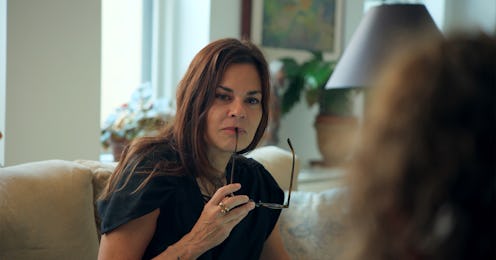Entertainment
Why Dr. Orna Guralnik From 'Couples Therapy' Was Initially Skeptical About The Show

When filmmakers Josh Kriegman and Elyse Steinberg approached renowned New York City-based clinical psychologist Dr. Orna Guralnik about Showtime's Couples Therapy, she was initially skeptical. As she told Refinery29, she wasn't sure if the deeply personal process of therapy would translate onscreen. But once they did a few trial runs, she knew they were onto something special.
"It was pretty incredible," she told the outlet. "They stayed utterly true to the mission and exceeded any expectations I could've had for this. I was just blown away. I said, 'You did some kind of magic here. I don't know how you guys did this, but you followed a true therapeutic, psychoanalytic narrative and put it on film. What you see is what really happened."
In order to be as authentic as possible, the Couples Therapy set was built as an exact replica of Guralnik's office, where she sees her regular, non-televised patients. The same books were stacked between them, the same shelf behind her. To prevent stage fright, the cameras remained hidden (with the couples' consent). According to Kriegman, her patients never even interacted with the film crew.
Once she realized objectively documented therapy was possible, Guralnik grew excited about its possibilities, and ultimately agreed to participate as a form of public service — her first brush with the mainstream. And even though the show may make her more recognizable when she's out for coffee, she made it a point to keep production from focusing on her personal life. She remains on faculty at the National Institute for the Psychotherapies where she is a teacher and a writer, per her website, and she still sees clients who are separate from the show. She wanted to make sure none of that was jeopardized.
"As documentary filmmakers, they wanted to know everything about me," she told Refinery. "My stance was, 'Look, this show is not about me. It's about the work.' If you include my personal life into it, you are misrepresenting the work. Anything you do with my personal story will contaminate the honest representation of the process of what therapy is really like, would hurt my current patients. I don't want to do that to them. It's a betrayal.”
Because therapy tends to be a long, involved, stop-and-start process, Guralnik warned viewers to do their best to withhold any knee-jerk judgements until the eight-part docuseries' end. "Observe your judgments. Note them to yourself," she continued to Refinery. "Watch the show all the way through until you see where all the couples end up for the duration of the show. You'll see your judgments morph. You'll realize that the story is so much more complicated and nuanced than your immediate first judgment. To learn how to suspend your judgement, hold them lightly, then watch them evolve as you get to know each other he’s character and what led them to where they are. You become a more compassionate person."
According to her site, Guralnik's teachings focus on the trans-generational transmission of trauma, socio-politics and ideology, psychoanalysis, and dissociation, and more specifically, how they pertain to couples treatment. She is also on the editorial boards of Psychoanalytic Dialogues and Studies in Gender & Sexuality, and she's the co-founder of the Center for the Study of Dissociation and Depersonalization at the Mount Sinai Medical School. Before becoming a psychoanalyst, she was a principal of research with Lucid Consulting, Worklab Consulting, and other organizational consulting firms.
So suffice it to say, she's plenty qualified to be shepherding her Couples Therapy clients through this newfangled TV therapy experience — and hopefully helping them in the process.